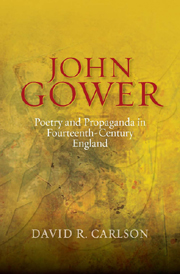Book contents
- Frontmatter
- Contents
- Abbreviations and Citation Forms
- Introduction: Gower in History
- I Fourteenth-Century Panegyric Verse and Official Writing
- II Gower's State-Official Late Poetry
- 6 Official Writing at the Lancastrian Advent
- 7 English Poetry in Late Summer 1399
- 8 The Cronica tripertita and its Official Source
- 9 Gower after the Revolution: Client and Critic
- Bibliography
- Index
- VOLUMES ALREADY PUBLISHED
6 - Official Writing at the Lancastrian Advent
from II - Gower's State-Official Late Poetry
Published online by Cambridge University Press: 05 February 2013
- Frontmatter
- Contents
- Abbreviations and Citation Forms
- Introduction: Gower in History
- I Fourteenth-Century Panegyric Verse and Official Writing
- II Gower's State-Official Late Poetry
- 6 Official Writing at the Lancastrian Advent
- 7 English Poetry in Late Summer 1399
- 8 The Cronica tripertita and its Official Source
- 9 Gower after the Revolution: Client and Critic
- Bibliography
- Index
- VOLUMES ALREADY PUBLISHED
Summary
By 1400, John Gower was an established literary figure, of long involvement in producing “public poetry,” in Anne Middleton's phrase, writing about relatively broad social and political secular issues. The Mirour de l'omme, the Vox clamantis, and the Confessio amantis were behind him, in circulation, before he delivered a public apology for the Lancastrian tyranny (in the ancient sense) early in that year. His Cronica tripertita is official verse panegyric.
Nor was Gower alone in propagating varieties of secular-social writing at the time, for by 1400 the literary system in operation in England was better populated with such figures than it had been in previous generations; and in general, the persons implicated were more often both secular in orientation at least and publicly engaged, as Gower was, as opposed to remaining preoccupied by religious-devotional intermuralia or narrowly courtly coterie-entertainments: the spectral secretarial figures, in the great household, drafting and reworking their reports of news from abroad for broad consumption at home; pamphlet-mongerers and the chroniclers without, like Robert Avesbury and Henry Knighton, who trafficked in such materials, reworking them for non-religious interests; and the poets, named like Laurence Minot or more often unknown, like the “Anonymous of Calais,” all implicating themselves in secular affairs by writing about them. Someone had to write the “Gloria cunctorum” in 1367; someone had to write the “Epitaphium Edwardi tercii” in 1377; and so on.
- Type
- Chapter
- Information
- John Gower, Poetry and Propaganda in Fourteenth-Century England , pp. 110 - 120Publisher: Boydell & BrewerPrint publication year: 2012



